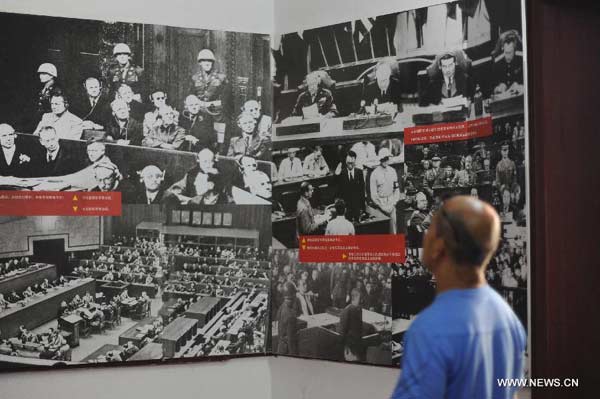China a forgotten WWII ally: historian
(Xinhua) Updated: 2015-08-05 20:07
 |
|
A visitor views the photo exhibition - Great Contribution: China and the Anti-fascist War of the World.[Photo/Xinhua] |
According to Hu, Japanese troops in China still far outnumbered those in the Pacific battlefield by the end of the Pacific War.
As for Europe, Japan, weighed down by China's resistance, had to turn down Germany's request for reinforcement in 1942 when Germany was deep in the Battle of Stalingrad with the Soviet Union.
Later, Japan would turn down multiple similar requests from Germany, freeing the Soviet Union from the worry of being outflanked.
"China's efforts forced Japan and Germany to fight battles independently of each other and to fail to cooperate strategically, giving the Allies an upper hand," the article said.
As part of the Allies' plan, Chinese troops also battled in Myanmar between 1943 and 1945 and liberated the country's north as well as the border area of southwest China's Yunnan Province after severe casualties.
The road linking Yunnan and Myanmar secured by Chinese troops would later greatly facilitate the Allies' counterattacks in Myanmar.
China maintained diplomatic ties with the Allies throughout WWII and also played a key role in helping set up post-War order, Hu said. He cited the Cairo Declaration, the outcome of the meeting attended by China, the United States and Britain in 1943 demanding Japan return all territories it invaded and offering the basis for handling Japan after its defeat.
In July 1945, the three countries issued the Potsdam Proclamation, another key legal document to demand Japan's unconditional surrender to the Allies and accelerating the end of WWII.
One of five permanent members of the United Nations Security Council, China played a key role in the planning and founding of the UN after WWII, setting down the Charter of the United Nations together with the United States, Britain and the Soviet Union in 1945.
"As a weak country then, China was brave enough to stand up against powerful Japanese fascism, maintained enduring resistance, greatly supported the United States, Britain and the Soviet Union in their own fights and hugely contributed to the establishment of post-WWII order and the founding of international organizations. History proves beyond doubt that China was rightfully one of the four major anti-fascist nations," Hu wrote.
- Kunming holds exhibition featuring victory in World War II
- Exhibition to mark victory in World War II
- Secret World War II documents show partnership in action
- Bulk World War II artillery shells found in NE China farmer's house
- Concert commemorating World War II victory held in Sichuan
- Poland commemorates 70th anniversary of end of World War II
- World War II memorial cemetery in Cairo




